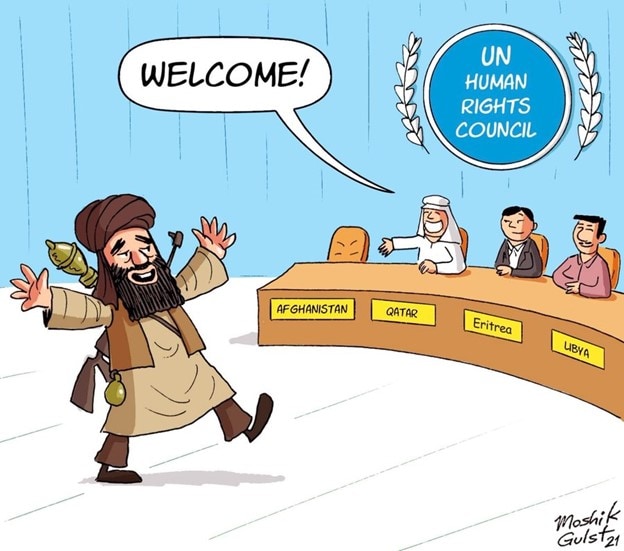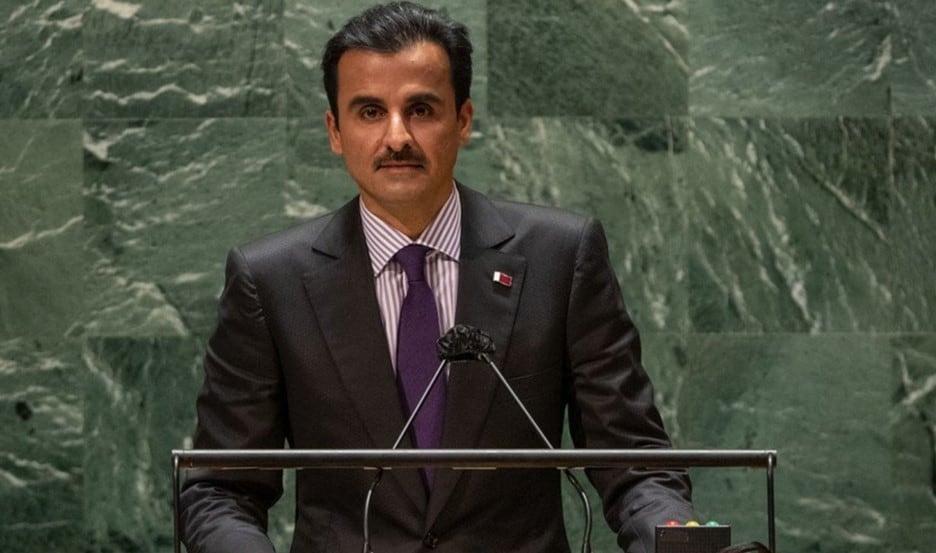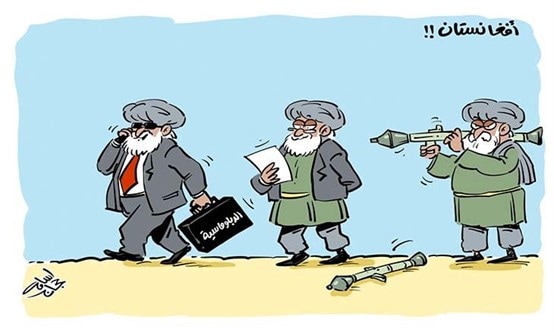Since the Islamic Emirate of Afghanistan (the Taliban jihadi organization) took power in Kabul in August 2021, the state of Qatar – known for shielding 9/11 mastermind Khalid Sheikh Muhammad from the U.S. and for its aid to jihadi organizations over past decades – has been campaigning for the recognition of the Taliban government by the UN and international powers.[1]

A cartoon depicting Qatar's advocacy of the Taliban (Twitter.com)
Qatar's diplomatic move to press for the recognition of a jihadi organization's control of power reveals complete disregard for the fact that the Taliban have ordered a total ban on the education of girls from grade six onward, in schools as well as in colleges and universities, in addition to banning women from working or travelling without a mahram (close male relative). According to the non-profit organization Save the Children, more than three million Afghan girls who were enrolled in secondary schools before the Taliban seized power are now being denied their basic right to education.[2]
These basic human rights make no sense to the Qatari royal family. As expected, Qatar has been in favor of the Taliban from the beginning, just as it supported other jihadis in different parts of the world. On September 7, 2021, the Taliban declared a list of 32 acting ministers and prime minister, forming an interim government.[3] Just two weeks later, the Emir of Qatar, Sheikh Tamim bin Hamad Al Thani, advanced the argument that any aid for Afghanistan must not be tied to policy issues.
Qatari Emir's Address At UN General Assembly
Addressing the UN General Assembly on September 21, 2021, the Emir stressed "the necessity of continuing dialogue with the Taliban because boycott only leads to polarization and reactions, whereas dialogue could bring in positive results."[4]
On September 18, 2022, two days before the Qatari Emir addressed the United Nations, the Taliban government, in its very first policy decision, abolished the Women's Affairs Ministry, which existed during the previous governments, creating in its place the Ministry for the Promotion of Virtue and Prevention of Vice.[5]

The Emir of Qatar, Sheikh Tamim bin Hamad Al Thani, speaks at the UN.
In diplomatic parlance, Sheikh Tamim bin Hamad Al Thani's talk about dialogue might be welcomed. However, in that very speech, the Emir of Qatar warned the West against any attempt "to impose a political system from outside."[6] An Associated Press report at the time noted: "His warning was directed at the many heads of state worried about engaging with the Taliban and recognizing their takeover of Afghanistan."[7]
The Qatari Emir went a step further, saying: "We also warn against the danger of isolating Afghanistan, and that this measure could produce the opposite results from those intended."[8]
The UN website, in a report on his speech, noted the Qatari Emir's call "for separating aid from political differences."[9] In his address, the Emir reminded the West that its effort to implement a democratic system in Afghanistan had already floundered, stating: "Regardless of intentions, efforts made and money invested, this experience in Afghanistan has collapsed after 20 years."[10]
Pakistani Analyst Aneela Shahzad: 'Is It Just Because Qatar Is A Neutral Country In The Vicinity, Or Are There Other Factors?'
In the context of Qatar hosting the U.S.-Taliban negotiations that resulted in the Doha Agreement of February 29, 2020 and the U.S.-Iran nuclear deal talks, Pakistani security analyst Aneela Shahzad asked in an article in November 2022: "Is it just because Qatar is a neutral country in the vicinity, or are there other factors that have made Qatar such a magnet?"[11]
She observed that Qatar added a policy of "balancing" to its preexisting policy of "band-wagoning" as part of its national security strategy, adding: "Qatar did not stop at that, between 2006 and 2011 it had literally allied with the Axis of Resistance, an anti-Western, anti-Israeli, anti-Saudi alliance involving Iran, Syria, Palestinian Hamas, and the Lebanese Hizbullah."[12]
Shahzad added: "Within its own borders, it hosts U.S. forces on one the hand and backs forces that are totally anti-US on the other. Since 2017, right after Saudi Arabia and other Arab countries severed diplomatic ties with Qatar, it gave a base to Turkey, allowing 3,000 Turkish troops on Qatari soil; built a trade route between Qatar and Turkey via Iran; and established direct shipping between Port of Mersin and Hamad Port. While Qatar allies with Turkey, Iran, and Russia on several fronts, it is also constantly keeping the Taliban regime of Afghanistan in the loop, and trying to facilitate a bridge for it with the U.S."[13]
In fact, this was the precise reason – Qatar's strategy for the "bridge to the U.S." – that the Qatari family has gone on to not only host the Taliban leadership in Doha, but also continued to advance the Taliban's campaign for recognition of their government at the United Nations and in dealings with other Western nations.
Instead – it has been argued previously – Qatar had agreed to serve as the "protecting power" overseeing U.S. interests in Taliban-ruled Afghanistan; Qatar has been "an enthusiastic and open supporter of the Taliban, very much in line with Qatar's open support for other Islamist movements worldwide"; and the Qatari royal family's "greatest strength is still economic and political, using money, media, and diplomacy to advance a broad Islamist agenda from North Africa to Kabul."[14]
Qatar's influence is so extensive that all roads lead to Doha. In January 2023, a UN team led by UN Deputy Secretary-General Amina Mohammed met Taliban officials in Afghanistan but before arriving in Kabul, the team members went first to Doha to meet with "groups of Afghan women in Ankara, Turkey, and Islamabad, as well as a group of ambassadors and special envoys to Afghanistan based in Doha, the capital of Qatar."[15] However, the UN team's appeals for allowing Afghan girls and women into public life were rebuffed by the ruling Taliban jihadi leaders. It is the lack of diplomatic pressure which has allowed the Taliban to continue to impose a total ban on girls' education from grade six onward.
Qatari Ministers And Officials Advocate For Afghan Taliban
Other Qatari officials have also turned away from any move to sanction the Taliban. Speaking in Dubai roughly three weeks after the Qatari Emir's UN speech, Qatar's Foreign Minister Sheikh Mohammed bin Abdulrahman Al Thani told an international conference that "isolating Afghanistan and its new Taliban rulers will never be an answer" and that instead, international powers should "incentivize" them and offer "guidance" to relax restrictions on women.[16]
In comments to Al-Jazeera in early 2022, Sheikh Mohammed bin Abdulrahman Al Thani, the Qatari Foreign Minister, stressed that boycotting Afghanistan and ignoring the crisis would not benefit the Afghan people.[17] Later, in October 2022, he reiterated Qatar's support of the Taliban despite their defiance of the world over the issue of the total ban on education for girls and women.[18]
Speaking at the October 13, 2021 Global Security Forum in Doha, the Qatari Foreign Minister emphasized that the problems cannot be solved without cooperating with the Afghan interim government, and that leaving the country to its fate would be a mistake.[19] In that speech, he stressed that "Afghanistan and the mentality of its people have changed" – a reference to misconceived expectations that Taliban rule will be different this time around.[20]

October 20, 2021 – A cartoon in Al-Quds Al-Arabi: The Taliban drops terror in favor of diplomacy
In November 2021, the Qatari Foreign Minister, speaking at a joint press conference with his American counterpart Antony Blinken, against the backdrop of strategic talks between the two countries, took up the Taliban's cause, saying: "Qatar believes that giving up on Afghanistan would be a great mistake, and that cooperating with the Taliban and persistently encouraging it to respect its commitments and promises to the international community is the only way forward."[21]
At an Organization for Islamic Cooperation (OIC) meeting on Afghanistan on December 19, 2021, Qatar's State Minister for Foreign Affairs, Sultan Bin Saad Al-Muraikhi, similarly pressed in favor of recognizing the Taliban government, saying: "Qatar urges the international community to continue cooperating with Afghanistan, for cooperation is the only way to promote stability, eliminate terror, and respect human rights."[22]
In fact, the Qatari leaders' diplomatic maneuvering for the recognition of the Taliban government began soon after the Taliban seized control of Kabul. In a September 24, 2021 interview on Al-Jazeera, Mutlaq bin Majed Al-Qahtani, the Special Envoy of Qatar's State Minister of Foreign Affairs for Counterterrorism and Mediation of Conflict Resolution, said: "From the political perspective, we should deal with the political reality in Kabul. We believe that communicating with the Taliban government is important for the international community, [because] a failure of the current government would be the failure of Afghanistan, [and] because this would have a detrimental effect on regional and global security. [Therefore] we are making every effort to increase the communication and dialogue between the international community and the interim government in Kabul."[23]
Al-Qahtani added: "In the recent weeks, we saw officials from the UN and from several countries hold some activity, contact, and meetings with the interim government, and we believe that is the right thing to do, although it is not necessary to agree with the [Afghan] side. Continuing this communication will yield positive results that will benefit everyone. [Conversely,] lack of cooperation with the government [in Kabul] can create a vacuum and a lack of control in some places, and may create loopholes that can be exploited by terror organizations. Therefore, we believe that it is possible to cooperate with the new government on this issue."[24]
Qatar, which has been hosting a "Political Office" of the Afghan Taliban in Doha since 2013, seems to have extensive influence among the leaders of the jihadi organization now ruling Afghanistan. In June 2022, the Taliban thanked Qatar for "paving the ground" for the release of Assadullah Haroon, a Taliban detainee, from Guantanamo Bay prison.[25] In June 2022, Qatar's National Security Advisor Mohammed bin Ahmed al-Misnad met with the Taliban government's first Deputy Prime Minister Abdul Ghani Baradar and pledged Doha's continued cooperation with the Taliban in all spheres of life.[26]
In December 2022, Qatar's successful mediation got the Afghan Taliban to release two Americans – one of them identified as filmmaker Ivor Shearer who was apprehended while filming the site of the U.S drone attack that killed Al-Qaeda leader Ayman Al-Zawahiri – were handed by the Taliban over to Qatar as a "goodwill gesture."[27] While Qatar's influence among the Taliban seems to be working effectively in all matters, it fails to impact the Taliban when it comes to international appeals urging the jihadi rulers to lift the ban on girls' and women's education.
* Tufail Ahmad is a Senior Fellow at MEMRI; Y. Yehoshua is MEMRI's Vice President for Research.
[1] MEMRI Inquiry & Analysis Series No. 1530, From The MEMRI Archives: Qatar's Role In 9/11 And Hosting Jihadi Commanders; Afghan Taliban's Hideouts Move To Safe Haven Of Doha, September 11, 2020.
[2] ToloNews.com (Afghanistan), March 16, 2023.
[3] MEMRI Special Dispatches Series No. 9566, Profiles Of Afghan Taliban Ministers – Interior Minister Is On FBI's Most Wanted List, 14 Ministers Including Prime Minister Are On UN Security Council's Terror Blacklist, September 28, 2021.
[4] TimesofIndia.indiatimes.com (India), September 22, 2021.
[5] Aljazeera.com (Qatar), September 18, 2021.
[6] TimesofIndia.indiatimes.com (India), September 22, 2021.
[7] TimesofIndia.indiatimes.com (India), September 22, 2021.
[8] Al-Raya (Qatar), September 21, 2022.
[9] News.UN.org/en/story/2021/09/1100492, September 21, 2021.
[10] TimesofIndia.indiatimes.com (India), September 22, 2021.
[11] The Express Tribune (Pakistan), November 25, 2022.
[12] The Express Tribune (Pakistan), November 25, 2022.
[13] The Express Tribune (Pakistan), November 25, 2022.
[14] MEMRI Daily Brief No. 338, Hiring An Arsonist As Fireman: Qatar To Serve As America's 'Protecting Power' In Taliban-Ruled Kabul, November 23, 2021.
[15] ZeeNews.com (India), January 21, 2023.
[16] Dawn.com (Pakistan), October 14, 2021.
[17] Al-Sharq (Qatar), February 1, 2022.
[18] ThePrint.in (India), October 26, 2022.
[19] Al-Quds Al-Arabi (London), October 13, 2021.
[20] Al-Quds Al-Arabi (London), October 13, 2021.
[21] Al-Raya (Qatar), November 13, 2021.
[22] Al-Raya (Qatar), December 20, 2021.
[23] Al-Sharq (Qatar), September 24, 2021.
[24] Al-Sharq (Qatar), September 24, 2021.
[25] The Express Tribune (Pakistan), June 24, 2022.
[26] ToloNews.com (Afghanistan), June 10, 2022.
[27] Dawn (Pakistan), December 21, 2022.





